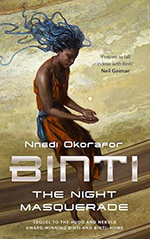
![]() Arifel
Arifel
1/28/2018
![]()
Third in a novella trilogy about Binti, a girl from the Himba tribe (who are a real people, living in Namibia) with a gift for mathematics and for "harmonizing" which takes her across the stars to Oomza University, and plunges her into an interspecies conflict between the alien Meduse, and the Khoush, a dominant human culture in her far future version of Earth. In each book, Binti faces challenges which threaten both her life and her cultural identity. The first sees her encountering the Meduse, a traumatic experience which leaves its mark on her at the same time as she is processing her own decision to leave home, something the Himba of the far future don't ever do, while showcasing the unique position she is in to broker peace with these allegedly unreasonable aliens. In the second book, Binti: Home, Binti returns briefly to Earth (even space universities need vactations) with her closest Meduse friend in tow, hoping her family will welcome her back despite her choice to leave - only to find that cultural expectations aren't that easy to overcome, and also that her cultural heritage may not be as straightforward as she thought.
In Binti: The Night Masquerade, we are still on earth immediately after the events of the second book. Conflict between the Meduse and the Khoush seems inevitable, but may still be prevented if the Himba choose to intervene - a solution which, we expect, will require both Binti's unique talents and her perserverence to pull off. From what seems like a standard conclusion to the series' themes, however, Okorafor takes her story somewhere completely different, subverting Binti's "chosen one" feel while simultaneously adding yet more complexity to her identity. While I wasn't sure how to feel about this during the book itself, I was left very happy with the conclusion - it stays true to the themes of each book, which are themselves a refreshing and much-needed change from classic space opera.
http://adrijoyreads.wordpress.com